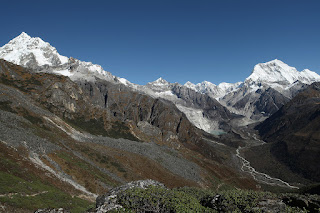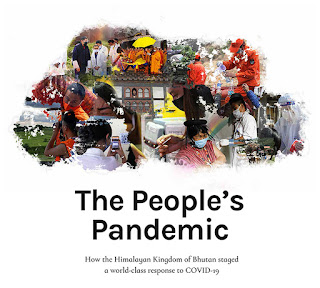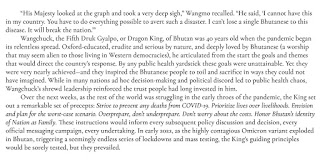Saturday, October 29, 2022
Greed Clouds Your Judgment – Contain It! II
Wednesday, October 26, 2022
Greed Clouds Your Judgment - Contain It!
I do not know if this rule still exists but it did in the late 1970s/early 1980s. The rule was that trucks plying on the hilly roads of Bhutan cannot carry load of more than net weight of 5 MT, irrespective of the truck’s carrying capacity. Net weight is the weight derived after deducting the tare weight from the gross weight.
But there was a problem: how to find out if a truck’s load was within the permitted limit? The answer: Weigh Bridge. Weigh Bridges are designed to weigh fully laden trucks by placing the truck atop the mechanical contraptions.
Given that there were not much traffic those days, the Ministry of Finance ordered and installed one single unit of the Weigh Bridge - in Phuentsholing, which even then was the commercial hub of Bhutan. The installation came into use and things began to work smoothly, until one day, a smart fellow in the Ministry of Finance decide that here was an opportunity to generate some additional revenue.
Consequently a rule was passed that required all trucks heading out of Phuentsholing into India, also to be weighed, and pay the weighing fee.
This is when the fun began - the smart aleck at the Ministry of Finance (I know the person but will not name him) forgot that the Weigh Bridge ordered by the Ministry of Finance was intended to weigh trucks carrying net weights not exceeding 5 MT. The reason being that trucks heading to Thimphu and the western regions in the north was not allowed to carry loads in excess of 5 MT. By contrast, the tare weight of the huge trucks, then known as “Punjab Body” trucks destined for India, weighed in excess of 7 MT.
Thus, on the first day the rule came into effect, the first Punjab Body truck destined for Hapur in India, fully laden with raw lumber blocks from the stock yards of the Export Division of the Ministry of Trade, Industry & Forests, positioned itself on the Weigh Bridge - with a combined gross weight in excess of 25 MT! The result was that the Weigh Bridge was crushed to the shape of a pancake - forever maimed and turned into a pile of scrap metal!
Now here it gets even more hilarious. Because the Weigh Bridge was smashed out of shape - no trucks could be weighed - but the truckers needed the wieghment slip to comply with the rules and to show to the police at the check gates. No problem - the person manning the Weigh Bridge station diligently wrote out hand-written weighment slips, with imaginary weights on them, and pocketed the fees - and no one was the wiser.
Monday, October 24, 2022
Spiting The Hand That Rocks The Cradle
This time it is the announcement that the visiting donors, or their Bhutanese hosts have to pay the SDF of US$200.00 per donor per day. This is the classic mentality of an accountant at work - the breed who are incapable of looking beyond their noses!
Is this how a society supposedly bursting at the seams with culture and tradition, treat our donors who come to our country to fund millions worth of projects that otherwise remain out of the reach of the government?
This is utterly insane, in addition to being illegal! Lawyer Sonam Tshering, in his article “Penny wise, pound foolish” clarifies: “Article 14 (1) of the Constitution states that “taxes, fees and other forms of levies shall not be imposed or altered except by law.”
I agree that some may have abused the privilege in the past … but pray tell me, who hasn’t? It is in the Bhutanese culture of pride - to pay obeisance to those whom we call “Chiikha Choe Mii” - persons who can bend the rules and hoodwink the system, persons who can regularly bleed the country blind, and yet are able to walk tall and dispense morality to others. Please remember that there is no such thing as a foolproof system - it does not exist anywhere in the world. Even God has failed in His due diligence.
What the government should try and do is plug the loopholes, and not put a blanket ban. Putting a blanket ban is the easy way out - it is devised by people who are unwilling to put in hard work - the lazy lot - they just put a ban in place and go to sleep!
Donors come, in most cases they are cajoled to come to Bhutan, to help us fund meaningful projects that the country needs. Do not forget that we need the donors, and not they us! Let us treat them with respect and not with spurn.
Let me give you the following example to prove how meaningful it is to have donors visit us, even at the cost of forsaking few thousand dollars of the precious SDF.
In 2017, the Rotary Club of Thimphu played host to an international Rotary Conference attended by 171 Rotarians and their spouses, from 9 countries. The event was held under the country's MICE rules. During the event, one Rotarian speaker from Malaysia - Rtn. K K Looi - spoke on a very interesting water filtration technology called SkyHydrant. I was thoroughly impressed by the technology. After the conference, in my capacity as the Club Secretary I pursued the matter with Rtn. K K Looi. He suggested that I write to Disaster Aid Australia (DAA) in Melbourne. I wrote to its then CEO - Mr. David Langworthy. Over time he agreed to support Bhutan with a total of 10 of these amazing filters.
The filters were very useful and suited to our type of geographical conditions, in addition to being simple to install and maintain. Thus, in one of our weekly meetings, I proposed to the Club Members that we invite the DAA’s CEO for a visit to Bhutan - so that he might inspect the installations of their donations, and see for himself how beneficial they were to the Bhutanese children.
The DAA CEO visited Bhutan - for a total of 5 nights, in 2018. That cost the RGoB a loss of SDF of US$ 65 x 4 = US$ 260.00. But at the end of the trip, the Minister for Education sought support for additional 60 filters. The CEO agreed without batting an eyelid - but to my consternation, the CEO doubled the asking number to 120! Thus began the saga of the project codenamed “BHUTAN2020”, launched in Toronto, Canada in 2018. Under this one million dollars project, Bhutan received 120 of these filters, installations of which were completed early this year. Even as I was exiting the Club, the DAA had agreed to renew the project for another three years.
Donors come to Bhutan to give - not to take. The above is not an isolated incidence - as at end of 2021, the Rotary Club of Thimphu has done over 150 million worth of projects - in diverse areas such as health, education, agriculture etc. - spanning the whole length and breadth of the country - all with donor money. All of the NGOs in Bhutan depend on donor money to fund meaningful projects for the people of Bhutan. To victimize all of these NGOs because some of them had misused the privilege is not right.
Donors need to come to Bhutan to plan and inspect projects - to satisfy themselves that their money is being well spent. Trust me, they are not the ones with the begging bowl.
In a situation where the global tourism market has been greatly impacted by the COVID-19 pandemic, it is my belief that Bhutan can do well to promote ourselves as a destination for MICE events. I truly believe in it and that is why I even proposed to the CEO of BTCL a few years back to consider setting up a world-class conference facility on their property in Olathang, Paro. When I got to hear and see the Royal Textile Academy’s architectural drawings of their planned world-class conference facility in Thimphu - I gave them a Thumbs Up and encouraged them to follow through their plan in real earnest. Sadly I was recently told that the government had not approved their proposal. That is so unfortunate and a tremendous loss to the nation and the people of Bhutan, in particular to the bleeding tourism sector.
FOR THOSE WHO HAVE DIFFICULTY IN UNDERSTANDING:
The R C Thimphu’s International Rotary Conference saw participation from 9 countries and 171 Rotarians and their spouses, not counting the Bhutanese Members.
The SDF foregone by the Government was: US$ 65.00 x 171 x 4 nights = US$ 44,460.00.
The total direct $$ collection the country received was: US$ 388,400.00 – not counting the indirect spending by the visitors on shopping, tips and meals in restaurants, and other additional costs they had to pay for their stay beyond the conference period.
What Bhutan seems to lack is competent financial experts on the helm of things - we have dire need for them. What we have are accountants whose only focus is on the cost, and not the benefit. The government has to come to grips with the fact that what it collects directly is pittance, compared to the overall benefit that the country and the people of Bhutan derive from any enterprise of commerce.
Thursday, October 20, 2022
A Little Known History
Monday, October 17, 2022
The Incredible Snowman Race
There is nothing not to admire about these racers - they are attempting to achieve something God never intended should be a normal human activity. Having myself plodded through all the regions that the racers will pass through during the race, I pay obeisance to these super athletes for their superhuman capacity and endurance.
To me it is of no consequence who wins the race - but that they have the level of fitness, tenacity, determination and the will power to successfully complete the race. I do not believe that the Snowman Race trail is the world’s toughest on its own merit - but for the fact that the distance is being conquered in the time frame of five days. That is the incredible thing!
A reputed international magazine contacted me - wanting to know if I would be interested to cover the race on their behalf. I said, YES!!! YES!!! YES!!. I told them that I already have all the passive footages they will need - from my treks into the alpine wilderness traversing the entire length of the race trail. The only thing is that I will need minimum of two helicopter rides – one to the top of Keche-La in Lunana areas, and another to the top of Jueley-La in Dhur areas, so that I am able to capture the racers on the go. The scene I would have been able to capture from the Jueley-La top as the racers snake up from Jueley Tsho to the top of the Pass, and then descend down to Animo Tsho would have been breathtaking. Racers racing upto the Kechey-La as they pass the lake on their right and then plunge down the Pass, would show some stunning scenes!
For whatever reason the magazine decided not to go through with the plan - my loss 😓
Something puzzles me: the fact that close to 50% of the international racers - no question they have got to be among the world’s most competent extreme altitude racers - had to withdraw on grounds of HAPE (High Altitude Pulmonary Edema). Thank God there has been no fatalities so far. Didn’t the racers acquaint themselves with the altitudinal variations of the race trail? That is the first thing they should have found out. They obviously did not.
Saturday, October 15, 2022
An Uncommon Girl in Kheng Khomshar
Monday, October 3, 2022
A Necessary Diversion
Zhabdung Ngawang Namgyel also received his first silver and gold coins in Chhukha Dzongkhag, although of foreign coinage, in and around 1619AD which he melted down to build a silver reliquary in Chari Monastery, to house the ashes of his deceased father.
Tuesday, September 27, 2022
True Friends Stand By Us
Friday, September 23, 2022
BHUTAN is OPEN
Thursday, September 15, 2022
The People's Pandemic
A battle like no other, and Bhutan came out smelling like the roses.
A book will soon be available to the Bhutanese people that will describe in detail how the battle was won, who were the strategists behind the scene and who were the foot soldiers.
The book provides undeniable proof that we live in a land that hasn't survived by accident.












.jpg)
.jpg)







